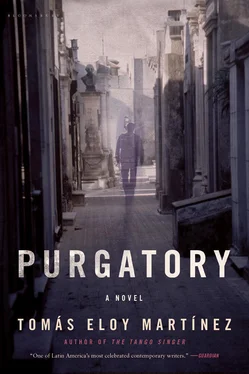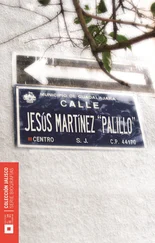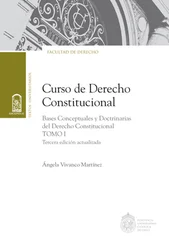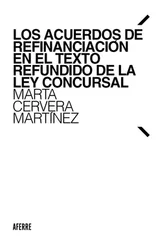Tomás Eloy Martínez - Purgatory
Здесь есть возможность читать онлайн «Tomás Eloy Martínez - Purgatory» весь текст электронной книги совершенно бесплатно (целиком полную версию без сокращений). В некоторых случаях можно слушать аудио, скачать через торрент в формате fb2 и присутствует краткое содержание. Год выпуска: 2008, Издательство: Publishing PLC, Жанр: Современная проза, на английском языке. Описание произведения, (предисловие) а так же отзывы посетителей доступны на портале библиотеки ЛибКат.
- Название:Purgatory
- Автор:
- Издательство:Publishing PLC
- Жанр:
- Год:2008
- ISBN:нет данных
- Рейтинг книги:5 / 5. Голосов: 1
-
Избранное:Добавить в избранное
- Отзывы:
-
Ваша оценка:
- 100
- 1
- 2
- 3
- 4
- 5
Purgatory: краткое содержание, описание и аннотация
Предлагаем к чтению аннотацию, описание, краткое содержание или предисловие (зависит от того, что написал сам автор книги «Purgatory»). Если вы не нашли необходимую информацию о книге — напишите в комментариях, мы постараемся отыскать её.
"Purgatory" narrates the anxiety of the love lost and then found in a magnificent reconstruction of the sinister events that went down in the time of the regime in Argentina.
Purgatory — читать онлайн бесплатно полную книгу (весь текст) целиком
Ниже представлен текст книги, разбитый по страницам. Система сохранения места последней прочитанной страницы, позволяет с удобством читать онлайн бесплатно книгу «Purgatory», без необходимости каждый раз заново искать на чём Вы остановились. Поставьте закладку, и сможете в любой момент перейти на страницу, на которой закончили чтение.
Интервал:
Закладка:
‘Sure, just give me a place and a time. I’m free right now.’
‘Not now. Tonight, eight o’clock. At Toscana, the restaurant where we first met.’
‘Toscana doesn’t exist any more,’ I remind her.
‘It doesn’t matter. The best places are those that don’t exist, just like on maps. I won’t be coming alone.’
‘So where then?’ I insist. ‘I don’t want to miss you. Once I’ve seen you, I’ll need to let the police know. I hope you understand.’
‘I understand. Eight o’clock then, at Toscana.’
‘On the corner there,’ I repeat so there’s no mistake. ‘Who are you with, Emilia?’
‘With Simón. We’ll both come. Tonight you’ll get to meet him.’
I held onto the photos and the clippings for a long time. I don’t know what to think. Obviously I’ll be waiting for her at eight o’clock on the corner of George and Paterson. Toscana does not exist but there is a point in reality where it does not matter whether or not it exists. Who is this Simón with her? I know that Simón Cardoso is dead, several witnesses testified to that fact. Tortured, a bullet through his forehead: it is all there in the transcripts of the trial of the comandantes . Maybe the man I’m going to meet is an impostor, an illusion created by Orson Welles from beyond the grave. If it doesn’t matter to Emilia, I don’t see why it should matter to me.
I’ll give her back the press cuttings tonight, I’ll ask her permission to publish what little I already know of her story. I could spend what remains of the afternoon taking notes on some of the other things she’s written in the folder. Most of it is unimportant, comments about the soap operas that were on television back then and also an account of the cruel incident which caused the rift between Emilia and her father. On one of the cuttings, I notice a small red circle and, underneath, a line from Dante’s ‘Purgatorio’ in the meek, childlike handwriting that was Emilia’s at the time: Quel color che l’inferno mi nascose . I know the line, it is one of the most famous lines of the poem: ‘That colour that in me Inferno had concealed’. Nothing in Emilia is chance, which meant that in writing that line she was alluding to a hidden story, one that burned her up inside, but one that she did not want to forget.
I’ve mentioned that when my cellphone rang, I had been reading one of her notebooks: ‘I know D is a dressmaker and I’ve asked her to make me some dresses. ’ This was just the beginning. At the end of November, the Spanish royal family were to visit Argentina and Dupuy wanted his daughter to accompany him to the gala ball the Eel was planning to throw. The doctor ordered a dinner jacket from his tailor and told Emilia to track down the finest fashion designer in Buenos Aires, suggested she call someone at Para Ti for advice. ‘I don’t trust you to decide what to wear,’ he told her, ‘and when you are my escort, you can’t afford to be anything less than the queen.’ He wanted her to wear a dress like the one Audrey Hepburn wore in Funny Face , though the only things Emilia had in common with Audrey Hepburn were her long legs and her dancer’s neck. ‘I want a dress that is simple but unforgettable,’ he said, ‘and just this once, I’ll let you wear your mother’s diamond earrings for the evening.’ Ethel could not wear anything now, not even the filmy skin that sheathed her body. She was covered with sores from her terrible allergies and even the touch of her nightdress made her whimper like a kitten; for most of the five days she spent in the mansion on the calle Arenales she was almost naked, soothing her tender skin in a lukewarm bath. Emilia did not leave her side: she sang to her as she sang to her dolls as a child, brushed her hair, stroked her head until she finally realised that she would be better taken care of in the home. On the sixth day she drove her mother back and returned to the loneliness and the torment of paying the debt which Dupuy implacably demanded.
Towards the end of 1978, the newspapers and the radio broadcast only what they were allowed. They had been doing so for some time, and by now fear and compliance had become habit. If human beings could disappear, if the houses where the destitute took shelter and the savings of the credulous and the old could disappear, why would inconvenient truths not also disappear? And so readers pretended to know nothing, telling themselves ignorance was bliss. The comandantes left it to Dupuy to take care of the unreality and concentrated solely on the armed repression. Madrid and Barcelona were hotbeds for fugitive extremists and it was vital to make the best possible impression on the king and queen of Spain, to give them a glimpse of the happiness and prosperity that flourished in Argentina. Dupuy was not about to permit any dissent from the media, not so much as the flutter of an angry wasp’s wing. ‘You should go so far as to prohibit making jokes about the royal couple,’ the Eel had told him. ‘I don’t want any gossip, any rumours, any stories about the past.’ Argentina was walking on eggshells and Europe was a flank which could not be ignored. The United States had been foolish enough to elect a president who appointed inquisitive, meddling diplomats. He was fanatical about human rights and the subversives were determined to use what little breath they still had to disrupt the royal visit. The honour of the nation was at stake.
Dupuy dispensed with the services of the journalist who had done such sterling work with the European papers before the World Cup. She might be able to pass as the wife of a carpenter, or even as a reincarnation of the Virgin in spite of her weight, but it was unthinkable that he could present her at a royal gala. He needed a journalist who was more ruthless, more refined. The admiral recommended Héctor Caccace who worked for his newspaper and whose manner was as graceful as his prose (officers and lawyers still talked about ‘good and bad pens’). Dupuy had never heard of the man and had his people make discreet enquiries. Caccace, his informants advised him, was cunning, a coward, maybe, but deferential to those in power. He was mortified by his surname Caccace — Caca sounded like Shit — and was taking steps to change it. In fact his cousin, Estéfano Caccace, a tango singer who was the toast of milongas at Club Sunderland, worked under the stage name Julio Martel to avoid such scatological connotations. Héctor had got ahead by arming himself with an arsenal of literary quotations which he wore everywhere like a whalebone corset. He knew which knives and forks to use, kissed the hands of ladies, effusively praised their gowns with little French phrases. Dupuy called him into his office and within five minutes decided he would do. He was a little affected but his pretentiousness could pass for elegance; there would be no complaints about him at the royal gala. Later, Caccace phoned him. He did not know how to apologise for his discourtesy, he waffled endlessly, infuriating Dupuy, and finally explained his problem to the doctor. ‘Having read the invitation, it’s clear that formal dress is required, and I don’t own a tuxedo.’ ‘Don’t waste my time with such foolishness,’ Dupuy interrupted him. ‘Go and rent one at Casa Martínez like every other journalist.’ Caccace hesitated a moment and then brought up the subject of the starched shirt front, the cufflinks, the shoes. ‘They’ll cost another hundred thousand, probably a hundred and twenty,’ he calculated, ‘and I haven’t got the money.’ ‘Come by my house and I’ll give it to you,’ Dupuy said contemptuously. ‘I’ll give you the money and a copy of the contract. Just do your job and stop fucking me around.’
Meanwhile, Emilia entrusted the making of her dress to D. She was quick, discreet and talked little. Her speech was peppered with clichés, but her work displayed more originality and talent than many of the fashion houses. She asked Emilia to get her a length of crêpe georgette and showed her the design she was working on. It was a tailored off-the-shoulder dress of clean, simple lines with broad straps and a silk trim around the waist. ‘What colour would you prefer?’ D asked. ‘I don’t know if I can wear something like that,’ said Emilia, ‘I’ll feel naked. It’s so daring, and as you probably know, my husband is not around, he disappeared. I’m more or less a widow.’ ‘I don’t know where my husband is either,’ said D. ‘They came to our house one night and took him and he’s never come back. I spent a year and a half searching for him. This country is a wasteland, a tragedy. Everything fades, disappears. What if I make the dress in black?’ ‘OK,’ Emilia accepted, ‘I’ll feel more comfortable wearing black. But I’d like the neckline higher, no décolletage.’ ‘Oh no,’ D protested, ‘do you want to ruin all my hard work? What about a square neckline? They’re very fashionable at the moment.’ ‘What should I wear over it? It needs to be something light because the weather is getting warmer and by the time the king and queen get here it will be worse.’ ‘A silk cape would suit you better than a shawl,’ said D. ‘Or maybe crêpe rather than silk, something you can drape lightly over your shoulders but can take off easily.’ ‘White? Ivory?’ suggested Emilia. D was not persuaded. ‘Against a black dress, ivory or white will just look like you bought something off the peg. How about pink? Dusky pink is very popular this summer. If you like I can trim the waist of the dress with dusky pink crêpe too.’
Читать дальшеИнтервал:
Закладка:
Похожие книги на «Purgatory»
Представляем Вашему вниманию похожие книги на «Purgatory» списком для выбора. Мы отобрали схожую по названию и смыслу литературу в надежде предоставить читателям больше вариантов отыскать новые, интересные, ещё непрочитанные произведения.
Обсуждение, отзывы о книге «Purgatory» и просто собственные мнения читателей. Оставьте ваши комментарии, напишите, что Вы думаете о произведении, его смысле или главных героях. Укажите что конкретно понравилось, а что нет, и почему Вы так считаете.












